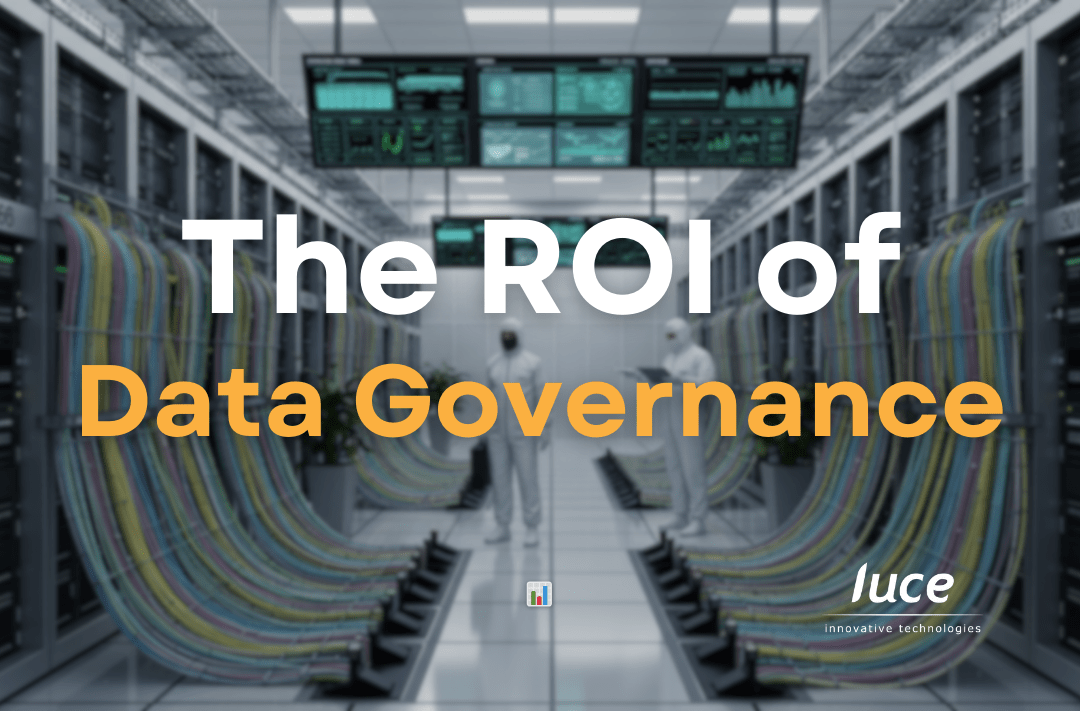
Data Governance: what is it and why does your company need it now?
We live surrounded by data. We generate it, we store it, we consult it, but do we really understand it? But do we really understand them, can we trust them, are we able to turn them into valuable decisions rather than just numbers piled up on a dashboard?
At Luce IT, we understand Data Governance not as a bureaucratic layer, but as a practice born out of common sense: bringing order to chaos, establishing clear rules of the game and making data work for people – and not the other way around.
Why do we talk so much about government?
Because all too often we come across organisations that ask questions such as:
- Where is the right data?
- Who can see it?
- Why does the sales report of two departments not add up?
- Is this data still valid or has it not been updated for 30 days?
When there is no data governance, projects move forward… until they break down. And they do so over small things: an ambiguous definition, an update that does not arrive, a table that nobody knows if it is the right one. The problem is not technical, it is one of trust and clarity.
Government doesn’t start with tools, it starts with people.
In our projects we see that the success of data governance depends not only on software, but on:
- Having a common and shared vision of data.
- Establish clear roles and responsibilities: who defines, who validates, who consumes.
- Promote a data culture where quality is rewarded, not just quantity.
Ensure that security, privacy and accessibility are balanced.
Symptoms that indicate you need a government
You don’t need a big audit to know this. It is enough to detect one of these “pains”:
- Reports that take days to build (and weeks to trust).
- Each department has its own “version of the truth”.
- You don’t know if you can scale your analysis to more users or more volume.
- You struggle to identify where a piece of data comes from (let alone audit it).
You are generating technical debt with improvised scripts and constant patching.
It’s not just about control, it’s about enabling growth.
To govern data is not to limit its use, but quite the opposite: it is to allow more people to use it, with confidence and autonomy. It is to stop wasting time cleaning, locating or interpreting data. It is enabling real use cases: predictions, real-time reporting, evidence-based decisions.
At Luce we have worked on proposals that:
- Design data architectures that do not disrupt operational systems.
- Implement scalable platforms where data is captured, transformed and activated without friction.
They focus on quality and traceability from the start, not as a later stage.
Where to start?
There is no need for a Big Bang. You can start by:
- Identifying your maturity level as an organisation: are you exploring, understanding or mastering data?
- Establish a data governance office, even if it is minimal: someone has to look after the rules.
- Choose a catalogue tool that helps you know what you have and how it is used.
- Train the key people. Data governance does not live in IT, it lives throughout the organisation.
Luce IT, your trusted technology innovation company
The Luce story is one of challenge and non-conformity, always solving value challenges using technology and data to accelerate digital transformation in society through our clients.
We have a unique way of doing consulting and projects within a collegial environment creating “Flow” between learning, innovation and proactive project execution.
At Luce we will be the best by offering multidisciplinary technological knowledge, through our chapters , generating value in each iteration with our clients, delivering quality and offering capacity and scalability so they can grow with us.



